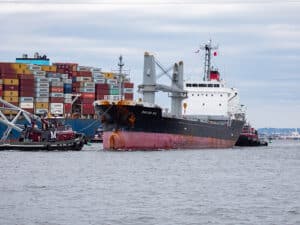
Net-Zero: Deadlines, designs and demands
Written by
Smoke exhaust gas emissions from a large cargo ship. (Credit: Shutterstock/GreenOak)
By C.F. St. Clair
For sjipping, a critical announcement from COP26 was the U.S. move, along with 14 other countries, to sign a Declaration on Zero Emission Shipping by 2050.
That is a major advance on the current (2018) IMO (International Maritime Organization) goal, of reducing greenhouse gases (GHG) by at least 40% by 2030, and possibly 70% by 2050, compared to 2008.
Just prior to the November COP26 meeting, the IMO’s “Intersessional Working Group on Reduction of GHG Emissions from Ships” met in October.
One document for the Working Group’s consideration was a proposal submitted by the International Chamber of Shipping (ICS) and INTERCARGO: “A levy-based MBM (market based measure), per tonne of CO2 emissions, to expedite the uptake and deployment of zero-carbon fuels.” For many reasons, an MBM is preferred to, say, an emissions trading system or mandatory emission limits, two approaches that could be unaligned with technological developments.
Alternative fuels
An MBM could offset the green price gap between traditional and alternative fuels. It could be established relatively quickly and timing, of course, is critical. The paper notes that it took seven years for IMO to finalize oil pollution funding, and that was seven years after several years of preliminary and informal discussions. Not to mention, 2030 is just eight years away.
Two other factors to highlight: A carbon levy can be linked to technology, thereby keeping “upward ratchets” dependent on the availability and applicability of zero-carbon technologies. “The rate and value of a fuel levy,” the authors write, “requires careful consideration, recognizing that in order for an MBM to be effective, the technologies to which the MBM is meant to expedite transition towards will need to exist for that transition to take place.”
Second, an MBM can be based on fuel burned, providing transparency and accountability and avoids a tempting slush fund that accumulates just because of calendar deadlines.
ICS and INTERCARGO reference another core programmatic concern: research, and, more particularly, a $5 billion R&D fund that was supposed to be established to advance zero-carbon technologies. ICS and INTERCARGO make clear that their MBM proposal is separate from the IMO’s R&D Fund (IMRF). The IMRF is referenced as a “short-term” measure. The MBM is “mid-term.” There is a chicken-and-egg reality here. Research has to deliver net-zero engines before a carbon tax can push people to buy those engines.
The ICS/INTERCARGO document provides insights into the difficult machinations within these international debates, complexities rarely referenced by diplomatic pronouncements about net-zero. ICS and INTERCARGO “reiterate the urgent need” to approve R&D funding and accelerate zero-carbon technologies.
“There is widespread agreement that large numbers of zero-carbon ships need to be delivered by 2030 if the current IMO level of ambition for 2050 is to be achieved. Technology Readiness Levels with respect to zero-carbon technologies and fuels suitable for marine application are currently inadequate to achieve this by 2030.”
ICS/INTERCARGO comment that R&D and MBM decisions, while separate, “simply depend on the political will of Member States to be taken forward.” They add a cautionary note: “If the Organization is unable to reach agreement on the IMRF, it is difficult to see how the Organization can realistically ever reach agreement about the far more complicated issue of an MBM.”
Engineers from a major American engine manufacturer, with products across market sectors, were asked to provide insight into some of the ICS/INTERCARGO concerns.
Fuel is the top consideration. Overall, these individuals don’t expect a singular solution that fits across all markets, like diesel today. They predict there could be multiple solutions, dependent on vessel application and regulations. While ammonia, hydrogen and methanol may be considered promising today, other fuels are likely to emerge. Implementation timelines are critical. From new engine concepts to production can take over five years. “The sooner this harmonization occurs,” they commented, “the sooner we will see changes in our industry.”
Bottom-line concern
Finally, don’t forget the bottom-line concern here: Regulations. At some not too distant point, what is agreed at IMO will be incorporated into international conventions to which the U.S. and other countries are signatories and. in turn, into regulations.
Jeffrey Lantz, U.S. Coast Guard, is the U.S. Head of Delegation to the GHG Working Group. Other reps, seven in all (including Lantz), are from EPA and Department of State. The group also includes an “Adviser” from the International Council on Clean Transportation.




